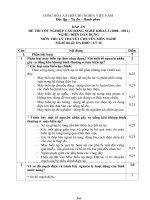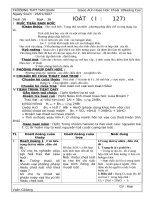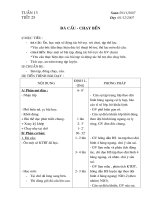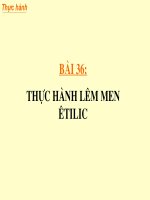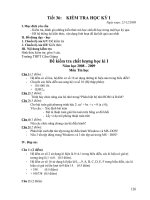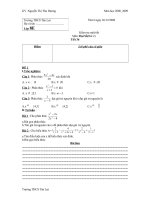PASSAGE 36
Bạn đang xem bản rút gọn của tài liệu. Xem và tải ngay bản đầy đủ của tài liệu tại đây (42.38 KB, 3 trang )
PASSAGE 36
Twenty-five students from Walling School are currently living in France. They are there for three months
as part of a living-abroad project. The 16- and 17-year-old students are living with French families and
attending a French school. Most of the students have taken French language classes for 3 or 4 years and
are finally getting on opportunity to use their French.
Not only ared students learning a new language, but they are learning about a new culture, too. Students
have been particularly surprised about the French attitude towards food. “They won’t leave anything on
their plate” says Vanessa Athol. “They aren’t wasteful at all”. Vanessa has vowed to be more careful with
waste when returning to the United States.
The group’s chaperone, Mrs. Smith, has been pleased with the students’ acquisition of language. “Even
the most timid are trying their best to speak. The students are learning a lot. I’m very impressed,” she
said. Mrs. Smith added that she thinks living with a French family makes a difference because students
are forced to speak French. “We are all very grateful to the French familes who are hosting us.”
The French families are happy to have the students, as they are getting to learn about American culture.
Both groups will be celebrating the exchange at a large potluck dinner at the end of the stay. There will be
a slide show of memories anf the students will speak about their experiences. Currently, the American
students are periodically posting pictures and student essays on the Walling School website. “Living in
France in an experience I’ll never forget,” writes student Tina Davis. “I know I’ll want to eat these
croissants and this Camembert for the rest of my life!”
Question 1. Which title would be the most suitable for this article?
A. French families love America
B. Student Tina Davis lives in France
C. Walling School website posts students essays D. Walling school students stay abroad in France
Question 2. According to the passage, which of the following is TRUE?
A. Students from Walling School are now staying in the USA.
B. These students are immigrants from the USA.
C. Walling School students are now staying with French families.
D. Walling school students are applying for jobs in France.
Question 3. What can be implied about the culture in France?
A. It scares the students.
B. It requires fluency in French.
C. It can be learned from a book.
D. It’s different from the culture in America.
Question 4. In paragraph 2, the word vowed is closest in meaning to _________.
A. promised
B. saved
C. received
D. changed
Question 5. In paragraph 3, the word acquisition is closest in meaning to __________
A. speaking
B. gaining
C. purchase
D. responsibility
Question 6. Based on the passage, what does Mrs. Smith probably think about the French language?
A. It is more beautiful tha Spanish.
B. It is verey important for international communication.
C. It’s best to learn it from a French family in France.
D. It is something each and every student needs to know.
Question 7. According to the passage, how will the students conclude their stay?
Page 1
A. They will take a French exam
B. They will have a party together
C. They will visit Paris together
D. They will stay in hostel together
ĐÁP ÁN
1-D
2-C
6-C
7-B
3-D
4-A
5-B
LỜI GIẢI CHI TIẾT
Question 1: D
Tiêu đề nào sẽ phù hợp nhất cho bài viết này?
A. Gia đình Pháp yêu nước Mỹ
B. Sinh viên Tina Davis sống ở Pháp.
C. Trang web của trường Walling đăng bài luận của sinh viên
D. Học sinh trường Walling sống ở nước ngoài tại Pháp
=> Dẫn chứng: Twenty-five students from Walling School are currently living in France. They are there
for three months as part of a living-abroad project.
Dịch: Hai mươi lăm học sinh từ trường Walling hiện đang sống ở Pháp. Họ ở đó trong ba tháng như một
phần của dự án sống ở nước ngoài.
Question 2: C
Theo đoạn văn, điều nào sau đây là ĐÚNG?
A. Học sinh từ trường Walling hiện đang ở Hoa Kỳ.
B. Những sinh viên này là người nhập cư từ Hoa Kỳ.
C. Học sinh trường Walling hiện đang ở cùng với các gia đình Pháp.
D. Học sinh trường Walling đang xin việc ở Pháp.
=> Dẫn chứng: The 16- and 17-year-old students are living with French families and attending a French
school.
Dịch: Các học sinh 16 và 17 tuổi đang sống cùng các gia đình Pháp và theo học tại một trường học ở
Pháp.
Question 3: D
Điều gì có thể ngụ ý về văn hóa ở Pháp?
A. Nó làm học sinh sợ.
B. Nó địi hỏi sự lưu lốt trong tiếng Pháp.
C. Nó có thể được học từ một cuốn sách
D. Nó khác với văn hóa ở Mỹ
=> Dẫn chứng: Students have been particularly surprised about the French attitude towards food. “They
won’t leave anything on their plate” says Vanessa Athol. “They aren’t wasteful at all”. Vanessa has vowed
to be more careful with waste when returning to the United States.
Các sinh viên đã đặc biệt ngạc nhiên về thái độ của Pháp đối với thực phẩm. Vanessa nói” Họ khơng để
lại bất cứ thứ gì trên đĩa của họ. Họ khơng phải là người lãng phí”. Vanessa đã thề sẽ cẩn thận hơn với
chất thải khi trở về Hoa Kỳ.
Question 4: A
Trong đoạn 2, từ “thề” có nghĩa gần nhất với _________.
A. hứa
B. lưu
C. nhận
D. thay đổi
Page 2
Question 5: B
Trong đoạn 3, việc “acquisition từ có nghĩa gần nhất với __________
A. nói
B. đạt được
C. mua
D. trách nhiệm
=> Dẫn chứng: The group’s chaperone, Mrs. Smith, has been pleased with the students’ acquisition of
language. “Even the most timid are trying their best to speak.
Dịch: Cô Smith, người đi kèm cùng nhóm, đã rất hài lịng với việc tiếp thu ngôn ngữ của học sinh. Ngay
cả những người rụt rè nhất cũng đang cố gắng hết sức để nói.
Question 6: C
Dựa trên đoạn văn, bà Smith có thể nghĩ gì về tiếng Pháp?
A. Nó đẹp hơn Tây Ban Nha
B. Điều quan trọng là truyền thơng quốc tế
C. Nó tốt nhất để học nó từ một gia đình Pháp ở Pháp.
D. Đó là điều mà mỗi học sinh cần biết.
=> Dẫn chứng: Mrs. Smith added that she thinks living with a French family makes a difference because
students are forced to speak French. “We are all very grateful to the French familes who are hosting us.”
Dịch: Bà Smith nói thêm rằng bà nghĩ việc sống với một gia đình Pháp tạo nên sự khác biệt vì sinh viên
bị buộc phải nói tiếng Pháp. Chúng tơi rất biết ơn các gia đình Pháp đang tổ chức chúng tôi.
Question 7: B
Theo đoạn văn, các sinh viên kết thúc việc sống tại Pháp như thế nào ?
A. Họ sẽ làm một bài kiểm tra tiếng Pháp.
B. Họ sẽ có một bữa tiệc cùng nhau
C. Họ sẽ đến thăm Paris cùng nhau
D. Họ sẽ ở trong ký túc xá cùng nhau
=> dẫn chứng: Both groups will be celebrating the exchange at a large potluck dinner at the end of the
stay. There will be a slide show of memories anf the students will speak about their experiences.
Dịch: Cả hai nhóm sẽ ăn mừng buổi trao đổi tại một bữa ăn tối lớn ở cuối buổi lưu trú. Sẽ có một slide
trình chiếu những kỷ niệm và các sinh viên sẽ nói về những trải nghiệm của họ.
Page 3

